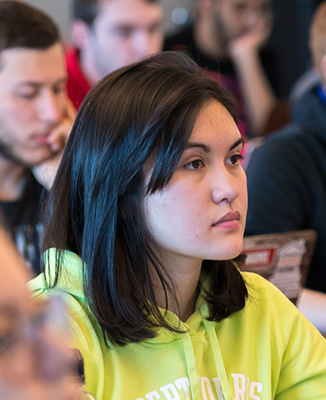UX/UI Design B.A.
Become a skilled professional in user experience and user interface design, UX/UI, to positively impact the way people work, live, and play.
The B.A. degree program in UX/UI design prepares students to become user advocates who utilize empathy to better assess client and user needs. Competency in UX/UI allows them to creatively improve experiences within various fields, including entertainment, marketing, information technology, and healthcare.
- Cross-Disciplinary Degree: UX/UI brings together research and studio frameworks from art, design, social science, engineering, information systems and communications to foster collaborations, ethical practices, innovation and leadership in human-centered design.
- Career Preparation for High-Demand Fields: As an interdisciplinary degree program, the B.A .in UX/UI prepares students for the emerging fields of user experience design and user interface design as well as product and service design.
- Competency in Digital and Physical Environments: Students gain hands-on and conceptual competency in creating meaningful and seamless interactions between people in both digital and physical environments.
- Degree Requirements and Courses
-
View Printable Course Sheet View Guided Curriculum
Required Courses in the Major - 48 credits
- ARTM1020 - 2D Studio and co-req lab ARTM0102
- ARTM1022 - 4D Studio and co-req lab ARTM0122
- ARTM1015 - Digital Foundations
- ARTM2010 - Idea Development, Writing and Storyboarding
- ARTM1880 - Interactive Media, Culture, and the Future
- ARTM1021 - 3D Studio and co-req lab ARTM0121
- ARTM2230 - 3D Computer Modeling or ARTM2510 - Intro to Product Design
- ARTM2220 - Designing for New media
- INFS2150 - Introduction to Web Development or ARTM2210 - Introduction to Web Design
- ARTM2110 - Intro to Graphic Design or ARTM3415 Sound Design
- ARTM3710 - Interactive Animation
- ARTM2040 - 360-Degree Storytelling and Immersive Experience Design
- ARTM2710 - Game Design Studio 1
- ARTM3720 - Game Design Studio 2
- ARTM4710 - Experience Design Studio 1
- ARTM4720 - Experience Design Studio 2; and co-req ARTM0400 Professional Practices Seminar
Cross-Disciplinary Courses - 18 credits
- ENGR2500 - Human Factors Engineering
- Programming or Writing course - choose: INFS2160 - Visual C# Programming; or INFS3240 - Python Program Language; or ENGL3020 - Creative Writing
- Programming or Writing course - choose: INFS3115 - Mobile App Development With iOS; or COMM4015 Transmedia Storytelling
- PSYC3250 - Sensation and Perception; or PSYC3600 - Social Psychology; or PSYC3450-A Cognitive Psychology
- Programming or Writing course - choose: INFS4170 - Global, Social, Ethical Issues in Computing; or ENGL3500 - Study of Persuasion
- ORGL2000 - Leadership & Popular Culture; or ORGL1200 - Diversity & Multiculturalism in Organizations
Open Elective Courses - 15 credits
Core Courses - 39 credits
- Program Learning Outcomes
-
- Understand dynamic business practices, write and enact flexible proposals, organize projects, work in and lead teams, collaborate with other disciplines, and develop fluid strategies to maintain currency in fast-moving fields;
- Identify experience design problems, raise ethical considerations, and understand human behavior, user / stakeholder needs through research driven processes, journey maps and use-case scenarios;
- Develop ideas and solutions through mind-mapping, sketching and wireframing; test ideas through analog and digital prototyping techniques; refine ideas by integrating useful feedback from user tests and stakeholders;
- Clearly and persuasively present ideas and concepts, prototypes, completed projects, and start-to-finish processes using oral, written and visual communication skills;
- Use a strategy of intelligent failure in order to learn resilience and critically evaluate work and the work of peers, as well as provide and accept constructive oral and written feedback in diverse settings.
- Copyright And Student Work
-
COPYRIGHT TO STUDENT CLASSWORK
Robert Morris University is a non-profit educational institution. Receiving and giving critiques on student work at the Media Arts Department at RMU is a required part of the evaluation of student work. Student work produced in classes is protected by U.S. Copyright Law. Each student owns the copyright to her/his original work the moment the “work is “fixed” in a tangible medium of expression…”[1]
STUDENT USE OF COPYRIGHTED WORK IN CLASS ASSIGNMENTS
If any part of the class work created is originally someone else’s creation:
1) the work must be in the public domain available for use without permission (generally work after 1922 is copyrighted); or
2) written consent from the copyright holder must be obtained to use the copyrighted work. That consent must detail the terms of the use, such as what exactly can be used, how much of it, in what format, if modifications are allowed, and how the work is to be credited. Also the duration of the consent must be listed and any possible terms set on how the work can be used geographically; or
3) if a course assignment states that it requires or allows the use of existing copyrighted work without consent, the assignment can only be displayed in this class. It cannot be used as part of a student portfolio, displayed publicly, or otherwise after the class has ended. The use has been one-time-only for learning purposes;
4) Education Exemption allows:
1. Display of a copyrighted work
2. By an instructor or pupil
3. In a face-to-face teaching activity
4. In a classroom or similar place17 U.S.C. § 110(1).
EXCERPTS FROM U.S. COPYRIGHT LAW
Copyright Law of the United States of America and Related Laws Contained in Title 17 of the United States Code. Circular 92, Chapter 1: Subject Matter and Scope of Copyright, http://www.copyright.gov/
title17/92chap1.html
Information closely related to media arts:
§ 102 . Subject matter of copyright: In general28
§ 106 . Exclusive rights in copyrighted works38
§ 107 . Limitations on exclusive rights: Fair use40
§ 110 . Limitations on exclusive rights: Exemption of certain performances and displays43
DISPLAY OF THIS SEMESTER’S STUDENT CLASSWORK
Classwork may be displayed on display boards, shelves, TV/computer monitors and/or other display surfaces in the Media Arts Department spaces in the Wheatley Center and/or the Academic Media Center as a part of required classwork in order to provide experience of exhibiting one's media arts work; in such a case the display identifies the work's author.
DISPLAY OF STUDENT CLASSWORK OUTSIDE CLASS
The Media Arts Department at times may display clearly credited student work (unless a student requests anonymity) at different University events on and off campus, and also in print or digital form, or online, as samples of Media Arts student work. Student work displayed outside class will only be displayed on a student’s written permission on the RMU Media Arts Student Copyright Permission Form. Course professors and/or the department will notify by email the students whose work is displayed or stored on reserve as samples of Media Arts student work.
RMU MEDIA ARTS STUDENT COPYRIGHT PERMISSION FORM
For your work to be displayed outside the class in which it was produced, you are required to give your written permission to do so. Media Arts course professors and the department have copies of the RMU Media Arts Student Copyright Permission Form available for that purpose. In order for your work to be available for outside class displays, please fill out and turn in a signed RMU Media Arts Student Copyright Permission Form to your course professor who will also sign the form and then turn it in to the department for it to be filed. If you are under 18 years of age, your guardian must sign the form. Each student participating in the semester’s Senior Exhibition is required to fill out, sign and turn in a RMU Media Arts Student Copyright Permission Form to their course professor as exhibiting one’s portfolio publicly in the show is a course requirement.
[1] U.S. Copyright Office - Copyright Law: Chapter 1, http://www.copyright.gov/
title17/92chap1.html - Career Preparation
-
-
Experience Designer
-
User Experience Designer
-
Product Designer
-
UI/UX Designer
-
Brand Experience Designer
-
Digital Designer
-
UI Designer
-
UX Content Designer
-
Lead UX Architect / Designer
-
UX/UI Manager
-
Interaction Designer
-
Information Architect
-
UX Researcher
-
Imagineer
-
Design Strategist
-
Product Strategy
-
Creative design manager
-
Director of experience design
-
Customer Experience Strategist
-
Front-end web designer / developer
-
Event Technical Director
-
- Demand for UX/UI Professionals
-
The demand for UX/UI professionals is strong both locally and nationally. RMU has the unique facilities and curricular capacity to aid in meeting this demand, higher in the Pittsburgh metro area than in any other part of Pennsylvania. For example, in early April 2021 almost 700 UX/UI jobs were posted in the Pittsburgh region.
Top employers were PNC Financial Services, Dick’s Sporting Goods Incorporated, Sysmind, The Bank of New York Mellon, CGI Group, Computer Enterprises, Techspace Solutions, Zillion Technologies, Sunray Informatics, and Beacon Hill Technologies.
Average salary, according to Burning Glass Labor Insight’s data on UX/UI, is, as follows with 95.7% obtaining a bachelor’s degree:- $76,900 with 0-2 years of experience
- $91,400 for 3-5 years of experience
- $96,500 for 6-8 years of experience
The median annual salary for UX/UI Designers was $91,289 with
- 75% earning more than $78,812
- 25% of those employed in the field of UX/UI with a salary of $105,027.
Projected growth of job postings for those with UX/UI experience is anticipated to increase by 11.4% over the next 10 years.
- Admissions and Tuition Information
-
- The minimum GPA is 2.75
- Applicants with a GPA of 2.74-2.50 are considered for admission on a case by case basis.
- SAT and ACT testing scores are now optional for freshman applicants.
- Estimated Tuition
- View costs and tuition information
- Scholarships, Professional Opportunities & Student Organizations
-
- Other Scholarships
- Work-study and scholarship opportunities
- Faculty-led Education Abroad Programs
- The University Honors Program
- Experience Design (XD)
- Society Design Network
- Gallery Club
- RMU eSports
- Tabletop Club
- Work Study
- RMU Scholarships
- AMC Scholarships
- Academic Media Center Student Media Innovation Scholarship Application
- Contact Us
-
The School of Informatics, Humanities and Social Sciences faculty is a team of dedicated teacher-scholars, award-winning artists, practitioners, and academics who are committed to your long-term success.
 Andrew Y. Ames, M.F.A.
Andrew Y. Ames, M.F.A.
Associate Professor of Media Arts
Coordinator, Media Arts Gallery
Arts and Humanities
ames@rmu.eduEdward Karshner, Ph.D.
Department Head of English and Media Arts
Professor of English
Karshner@rmu.edu - Our Graduates Work at
-
Examples of relevant employment sites of graduates of our former Interaction Design BA and BFA programs, from which we further developed our interdisciplinary B.A.in UX/UI degree program:
- Treatspace, Inc.
- CGI Client Global Insights
- Fivestars
- Testimonials
-
"Robert Morris University provided a great opportunity to gain new knowledge and experience as a then (interaction design) now UXUI major. Over the course of four years, there was exceptional faculty that encouraged and taught students to hone their skills as designers. Professor Andrew Ames creates a fun environment in his interaction design courses while giving students a deep understanding of design thinking. These courses provide a well rounded education and will prepare you with a solid foundation for future employment." ~ Ryan Silk class of 2021
Sample Courses:
These are some of the classes for students in this academic program:
Top Employers

Call us at:
1-800-762-0097
School of Communication and Media
The School of Communication & Media offers many varied programs that prepare students for dynamic careers in media, communication, and design.
Visit School Site
